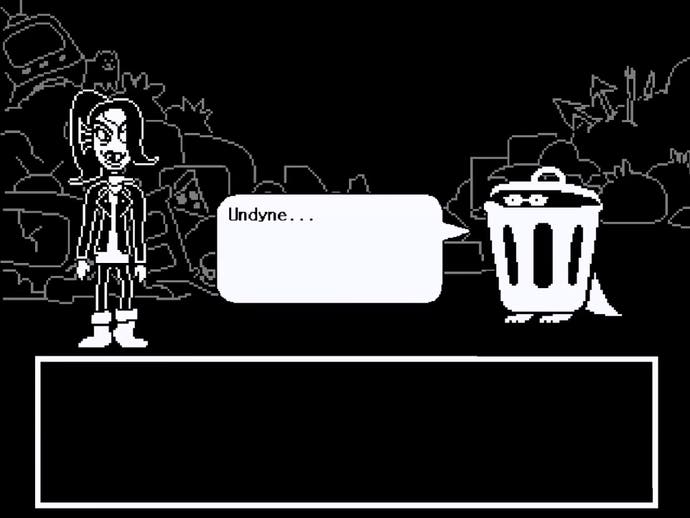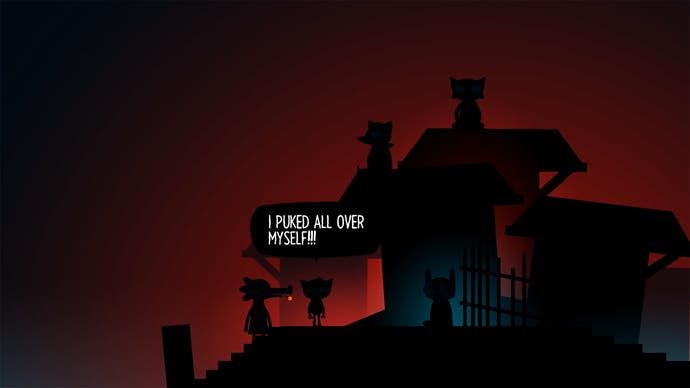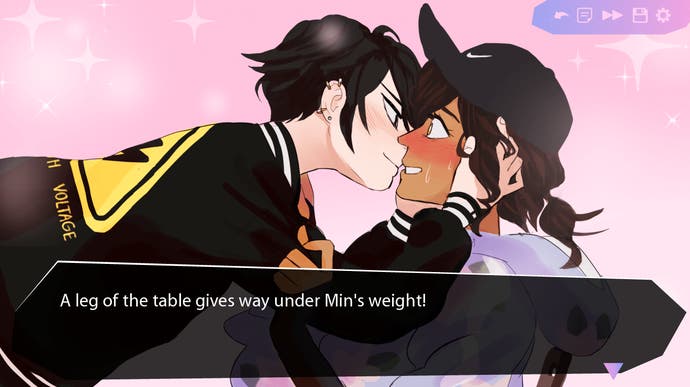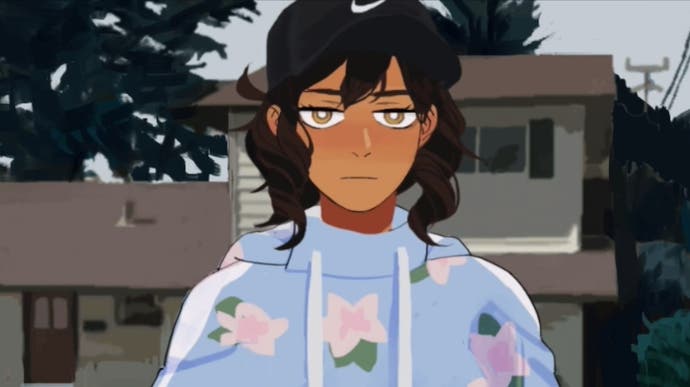Celebrating the humanisation of queer women through humor in video games
"You may pass unburdened."
I kicked off Pride month by watching Booksmart, a charming and funny coming-of-age story that explores identity, sisterhood, and queerness. In my favorite scene, one of the protagonists has sex for the first time. She's drunk, nervous, and it's not just her first time getting laid - it's also her first time acting upon her attraction to women. It starts out fine, but then in the middle of it all, she pukes on her partner. Her partner screams in disgust, she runs out, and my best friend and I squirm in our seats from the worst case of secondhand-embarrassment we've ever had.
After it ended, I realized how magical it was. Not the vomiting, reader, but a queer woman having a romantic scene that was funny in ways that didn't serve to make her more appealing to the audience.
In the media, women are rarely allowed to mess up and be humorous - especially at the same time - and romances for queer people have often been wrapped in mystique, tragedy, and melodrama. As we near the end of Pride month, I find myself fondly remembering Undertale, Night in the Woods, and Butterfly Soup for each having a scene in which queer women actualize their feelings, or reminisce on a time they attempted to do so, and fail spectacularly or embarrass themselves. In an industry that most often represents straight men, it's not only refreshing, but also vital for queer women to have stories that humanize us through concepts like comedy and authenticity that are often made to feel inacessible.
After years of denial, I came out in 2015 - which also happened to be a pretty good year for queer women in mainstream video games. One of those games was Undertale, which has two queer women among its vibrant and unforgettable cast of characters. As a socially anxious and shy woman who has a crippling fear of failure, I connected with the nerdy royal scientist Alphys the most - and it's she who's the focus of one of Undertale's best scenes.
The scene above explores the all too common shyness between queer women who are attracted to each other, social anxiety, and an issue that has plagued mankind for decades: whether anime is real or not. It starts by Undyne, the captain of the royal guard, asking Alphys out on a date through a letter she makes you deliver. Because of this, Alphys thinks you like her, so she proceeds to take you out to the most objectively romantic and ideal spot for a first date: the garbage dump.

Undyne shows up halfway through your date, feeling it's best she give the letter directly to Alphys. While she goes off to search for Alphys, Alphys confides in you that Undyne is the person she likes; however, she's unable to confess because she feels like a fraud. She's the royal scientist - someone who, under the king's requests, has conducted experiments that have hurt many people. The guilt she's harbored over her career has led to her lying about who she is to the person she likes. "They say 'be yourself.' But I don't really like who 'myself' is," Alphys says. When Undyne returns, Alphys tells her the truth about all the things she's said and done to impress her, like watching anime instead of history movies or reading comics instead of academic books.
Undyne's reaction is to throw Alphys into a trash can, where she belongs - not for having lied, but for thinking she wasn't good enough, of course. With a charged battle theme playing in the background, Undyne extremely aggressively (for she knows no other way) reassures Alphys that what she likes or does has never mattered to her because she likes Alphys for her passion, analytical personality, and kindness. It's all sweet and touching, but it's also downright silly. Imagine confessing to the person you like, then getting thrown into a trash can, and having to stay there until they finish an emotional speech about how rad you are. Yes, they're talking about how fantastic you are, but you're still in a smelly trash can.
Maybe it might be an issue for you, but it's in the area of experience for Mae Borowski, the protagonist of Night in the Woods, who calls herself as a "trash mammal." (Same.) In Mae's comedic queer baby story, there is also puking involved. It begins by Mae robbing graves with her friend Bea in the middle of the night when the two hear voices. These voices belong to a group of quirky emo teenagers, one of which asks Mae to relay her most embarrassing experience in order to let her pass through a gate. As Mae, you have three options, with one story taking place in college before Mae dropped out and returned to her hometown.
The story goes that there was a cute girl who Mae would see at the cafeteria a few times a week. One day, she worked up the courage to talk to her, which sets off a series of events that my mom would describe as going "from Guatemala to Guatepeor" (In Spanish, "mala" = bad; "peor" = worse).

When the girl turns around after hearing Mae scream a greeting at her, Mae only thinks to wave. Mae is immediately mortified and ready to question her whole existence, so she turns around and runs into a door frame behind her. It hurts, so she staggers back until she falls into a trash can. Her face goes into the trash spaghetti in the trash can. This makes her flail until the can tips over. Mae's crush has watched this entire trash fire unfold, so when Mae realizes this, she gives her crush a smile to make it seem like she totally meant for that entire mess to happen. But she had swallowed the trash spaghetti from having her face in the trash can. So when she smiles, her teeth are decorated with trash spaghetti, and after everything is done, she throws up on herself. While her crush is still watching.
Night in the Woods makes sure to drive home how embarrassing and gross this story is. Bea tells Mae, "No wonder you came home." One of the teens tells her, "I'm going to throw up. Thanks for nothing." Another can only bring himself to say it's messed up. And then there's an unintentionally beautiful moment at the end of it all, when the final teen tells her, "You have come face to face with your lowest moment. You may pass unburdened."
While every story is met with that same response, there's a different feeling that this one elicits for me, as a queer girl just like Mae. No one downplays what happened nor do they make her feel better about it. The game centers on Mae being flawed: on her not becoming a perfect student, not always being a good friend to the people who care for her, and not fulfilling her parent's expectations. Women are so rarely allowed to screw up, to make genuine mistakes and, even more so, to fail upwards. Night in the Woods lets Mae confront a moment in her life where she failed and was humiliated, and it shows that women need not carry the burden of defining themselves by their mistakes; it's only human to screw up.
And screwing up is something that the endearing teen girls of Butterfly Soup take in admirable strides. The game ends with Diya and Min-seo, two childhood friends, confessing their feelings to each other. The two go to an ice cream shop and eat a sundae together as Min prepares to confess. Halfway through, Diya becomes so nervous that she goes to the bathroom, misses the door and slams into the wall in front of Min. Their two other friends are in the background, poorly disguised and spying on them, unbeknownst to Diya.

It feels like a universal truth that everyone's first kiss is...not the best, but I don't know how much worse it can get than the other person telling you mid-kiss that they looked up how to do it on Yahoo Answers. Yet this is exactly what Min does. As they eat a sundae together, Diya comments, "My mouth is so cold." Min replies with, "Want me to warm it up for you?" The line itself is awful and she says it while clearly being nervous, so it's not even remotely sexy - rather, it's almost mortifying to read.
As they kiss again, one of the table's legs give out, causing it to break and them to be banned from the shop. It's awkward and embarrassing, funny and lighthearted; it's exactly the cheesy kind of queer romance I've wanted to see more of. Even though two women kiss on the screen, their intimacy doesn't exist to be fetishized; it exists simply as the actualization of the pure feelings between two girls. It's not a perfect first date or first kiss, but it's theirs to remember and laugh at in the time to come.
And I'll certainly remember not just these scenes, but these games overall in the time to come. As I search for places to go to with my best friend to celebrate our first Pride together, I'm left with few options, even in a place like Miami that's known for its vibrant queer culture. LGBT spaces are largely meant for cis gay men, and the few spaces for sapphics tend to be nightclubs and bars - where a certain level of confidence feels expected. And I'm not yet as confident as I'd like to be - as a young woman, as a queer lady, as a person.
But it's largely due to engaging with media like these three games - games that authentically, humorously, and joyfully celebrate queer women as the complex human beings that we are - that I've been able to accomplish gaining a level of confidence in the last few years that I struggled with obtaining throughout my entire life. We deserve to, like Alphys, grow to love who our real selves are; to, like Mae, embrace our inner trash mammals and see ourselves as more than our flaws; and, like Min and Diya, to experience love and life and all their beautiful and chaotic turns, so that we can then pass on our knowledge and encouragement to other queer people on Twitter and Tumblr, like those before us kindly did on Yahoo Answers.


